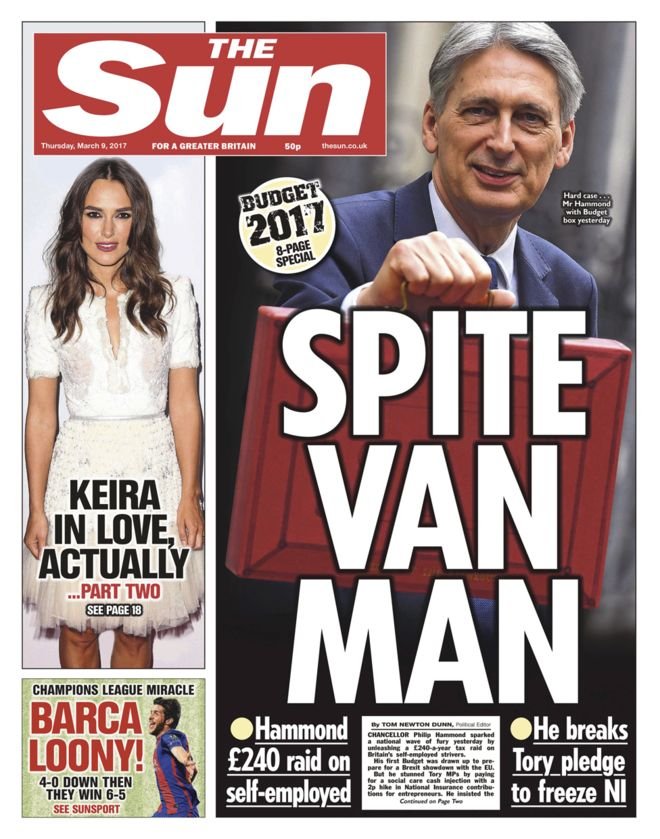LONDON — Thursday’s newspapers made very unhappy reading for the Chancellor Philip Hammond.
They all lead on his Budget announcement that National Insurance Contributions will rise for the self-employed.
The reaction seems odd. The policy makes the tax system more fair, is broadly popular, and is intended to hit wealthy “freelancers” like CEOs who use self-employment status as a tax dodge.
The policy also fills a hole. Because so many of the new jobs created in recent years have been self-employed, it’s reduced the amount of tax the government can collect and use for public services.
However, the front pages had a very different reaction, playing it as a broken promise that will take money from “white van man,” the self-employed plumbers and electricians whom the tabloid press love to champion.
So why is this?
Well it turns out that this aspect of the tax system hits a specific nerve for some papers. Let’s go through them one by one.
The Sun splashed with “Spite Van Man” claiming that Hammond’s broken promise “sparked a wave of national fury.”

The Metro, which is now the UK’s most widely-read newspaper, had a similar take.
 Metro
Metro
The Star also went for this angle with the pun “Rob the Builder.”

While the Daily Mail opted for a huge picture of the chancellor laughing during his budget speech, while “hammering the self-employed.”

The Mirror had a similar take, but opted for a picture of May instead.

While the Telegraph, which was once the most reliable of papers for the Conservatives, posted a picture of the party’s 2015 manifesto pledge alongside the headline “Tories break tax vow.”

Meanwhile the Times labeled it a “£2bn tax raid.”

And the Guardian said Hammond had “fallen into a tax trap.”
 Guardian
Guardian
Media Fury
The scale of the reaction is surprising. After all the change is relatively small, just a 2% rise in NICs for some self-employed people. It is also, as this graph from the Resolution Foundation shows, a progressive change as it will mostly affect the more well-off self-employed while cancelling out a benefit that is not received by people who are employed.

The policy is also popular with the public. According to a Sky News poll, 57% of people support it with just 30% being opposed. The Conservatives recorded a 19 point opinion poll lead in the days following the Budget.
However, there are several reasons why this has become such a big story.
The broken promise
Governments often break promises but they rarely do so as blatantly as this. The Conservative’s 2015 manifesto repeatedly committed not to raising NICs while Cameron went big on the issue during the campaign, regularly using speeches, interviews and debates to accuse Labour’s Ed Miliband of secretly planning to raise NICs.

The weak defence
Britain’s political correspondents tend to hunt in a pack. At the post-Budget Treasury briefing there was definitely smell of blood in the water as it became clear that Hammond’s spokespeople had no real defence for the broken promise. Instead of defending it as fair or necessary, they repeatedly claimed that it was in fact not a broken promise at all. Bizarrely they claimed that legislation passed after the election (which made no mention of raising Class 4 NICs) somehow cancelled out promises made before the election. It’s fair to say that this didn’t go down well with the parliamentary press lobby.
Who it affects
The Sun love this story as it allows them to paint it as an attack on their core readership, which is stereotypically seen as the “white van man”. However, as the graph above shows, this policy will in reality mostly affect more well-off self-employed people. Crucially these are exactly the sort of people who have the ear of both Conservative MPs and of course the editors of national newspapers. And of course it will also affect…
Many political journalists themselves
Many of the people who cover British politics are on self-employed contracts themselves and so will be directly affected by this change. Like Labour’s proposed “mansion tax”, which received huge amounts of coverage despite threatening to affect only tiny numbers of people, the NICs change is likely to get a far bigger response from the press than it really deserves.













